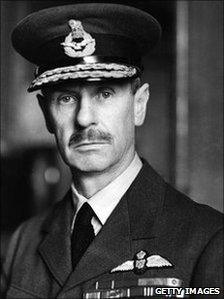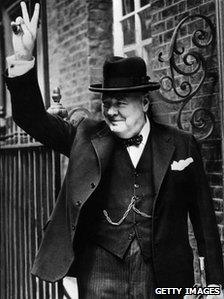Battle of Britain hero Hugh Dowding honoured in Moffat
- Published

Air Chief Marshall Dowding is credited as masterminding the Battle of Britain
Every year a south of Scotland town comes to a halt to remember the man who masterminded the RAF's victory in the Battle of Britain.
Moffat in Dumfries and Galloway is proud to have been the birthplace of Air Chief Marshal Hugh Dowding.
A memorial stands in his honour in the town's Station Park and each September a flypast is held in his memory.
This year, the 70th anniversary of the successful defence of the skies over Britain, they remembered him again.
A service, wreath-laying and a flypast by a Spitfire and Hurricane fighter plane were held in his honour on Sunday, just as they have every year since the early 1970s.
It is a tribute his birthplace happily makes to the "architect of deliverance".
Hugh Caswall Tremenheere Dowding was born in the Victorian spa town in 1882.
After his early schooling in the area, he quickly pursued a military career which would ultimately see him become a leader of "The Few" in the Battle of Britain.
A squadron commander in the Royal Flying Corps in World War I, he stayed in the new Royal Air Force and became chief of Fighter Command by 1936.
His push for the development of radar and the Spitfire and Hurricane fighters is seen as a key to defeating the Luftwaffe.
He also decided the dates for the Battle of Britain although he admitted the start date had been "somewhat arbitrary" and only chosen because it marked the first major raid over the country.
It was Dowding's strategic and tactical skill which has been credited with allowing the outnumbered British forces to ultimately thwart the German raids.
In 1968, just a couple of years before his death, he told the BBC about his memories of the 16-week period in 1940 which became known as the Battle of Britain.

Dowding felt Churchill did not like being made to change his mind
"The overriding memory is one of intolerable stress, mingled of course with anxiety that so much depended on our shoulders in the Fighter Command to prevent the country being invaded and vanquished," he said.
One key moment was his visit to the War Cabinet to try to persuade Winston Churchill not to send any more pilots and planes on operations over France after 3 June 1940.
Dowding said he believed it would leave Britain too vulnerable to air attack at home, an argument which eventually won the day.
"The important thing was that virtually and substantively the leakage of fighter aircraft to France was stopped," he said.
"I never was very friendly with Churchill because he had been made to change his very stubborn mind in front of a room full of senior officers and officials in the country and he didn't like that.
"I don't think he ever liked me very much after that, if he had liked me before."
'Decisive battle'
It did, however, give Dowding precious time to try to improve equipment and train his pilots in the build-up to the start of the Battle of Britain in July.
That fight would last until October of the same year but mid-September was seen as the turning point in Britain's favour in a battle which would force Adolf Hitler to indefinitely postpone invasion plans.
Historian AJP Taylor described it as the "decisive battle of the war" and said it was won by Dowding.
He believed it was a victory which was as "glorious in our history as the Battle of Trafalgar".
The architect of the triumph died in 1970 in Tunbridge Wells in Kent.
His memory, however, is still kept very much alive in the town where he was born.
- Published28 August 2010
- Published19 August 2010